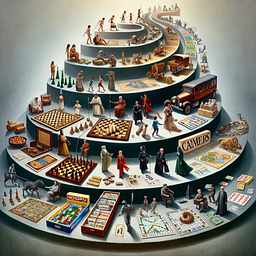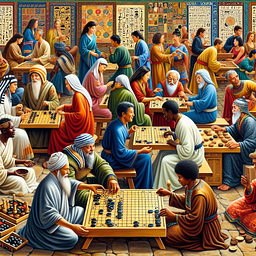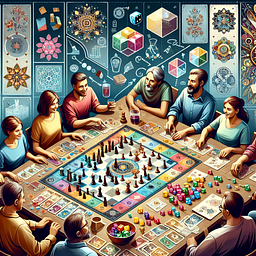Understanding the World of Board Games
Board games have been a beloved pastime for centuries, offering a unique form of entertainment that combines strategy, social interaction, and often a touch of luck. From the ancient Egyptian game of Senet to the modern classics like Monopoly and Scrabble, board games have evolved and adapted to different cultures and eras, leaving an indelible mark on the fabric of human leisure.

What sets board games apart from other forms of play is the physicality of the game itself, with players gathering around a shared board, moving pieces, and engaging in a dynamic, face-to-face interaction. This tactile experience, coupled with the mental challenges presented by the game's rules and objectives, creates a rich and immersive gameplay that has stood the test of time.
Board games are not just a means of entertainment; they also serve as a window into the societies and cultures that created them. The themes, mechanics, and even the materials used in board games often reflect the values and interests of the people who played them. For example, ancient Egyptian board games like Senet were not just for fun; they were also seen as a metaphor for the journey of the soul through the afterlife, with the game's layout representing the various stages of the soul's passage.
Over the years, board games have also been the subject of much scholarly study, with researchers from various disciplines, including psychology, sociology, and game theory, delving into the intricacies of gameplay and its impact on individuals and societies. This academic interest has not only deepened our understanding of board games but has also contributed to the development of new and innovative games that push the boundaries of the medium.
Despite the rise of digital gaming, board games continue to thrive, with a dedicated and passionate community of players and collectors. The resurgence of tabletop gaming in recent years has seen a proliferation of new games, from complex strategy games to quick and casual party games, catering to a wide range of tastes and preferences.
In this comprehensive guide, we will take a closer look at the history, types, and significance of board games, as well as the challenges and controversies that have shaped the industry. Whether you're a seasoned board game enthusiast or a curious newcomer, there's always something new to discover in the world of board games.
The Historical Tapestry of Board Games
The origins of board games can be traced back to the dawn of civilization, with early examples found in archaeological digs and ancient texts. These early games, often simple in design and materials, were a testament to the ingenuity and creativity of our ancestors, providing not just entertainment but also a means of socializing and passing down cultural knowledge.
From Ancient Civilizations to Medieval Europe
Board games were a common sight in many ancient civilizations, including Egypt, Mesopotamia, and India. The Egyptian game of Senet, dating back to around 3100 BCE, is one of the oldest known board games and was played on a grid of 30 squares, with players moving their pieces based on the throw of dice-like objects.
In India, the game of Chaturanga, a precursor to modern chess, was played as early as the 6th century CE. This game, which featured different types of pieces and a board divided into 64 squares, was not just a pastime but also a reflection of the complex strategies and philosophies of the time.
As civilization advanced, so too did the complexity and variety of board games. Medieval Europe saw the rise of games like Backgammon, which combined elements of luck and skill, and Chess, a game of pure strategy that remains popular to this day.

The Modern Board Game Renaissance
The 19th and 20th centuries witnessed a renaissance in board game design, with the Industrial Revolution and advancements in printing technology making games more accessible to the masses. This era saw the birth of iconic games like Monopoly, Scrabble, and Clue, which have become cultural touchstones and continue to be enjoyed by millions worldwide.
Today, we are in the midst of another board game renaissance, with a new wave of designers and publishers creating innovative and immersive games that cater to a wide range of interests and play styles. From cooperative games that foster teamwork to narrative-driven games that blur the line between storytelling and gameplay, the modern board game landscape is as diverse and exciting as ever.

Understanding the evolution of board games is not just a journey through history; it is also a window into the human experience, reflecting our social structures, values, and aspirations. Whether you're a casual player or a serious collector, the world of board games offers a rich tapestry of stories and experiences that continue to captivate and inspire.
The Diverse Landscape of Board Games
Board games come in a myriad of forms, each with its own unique mechanics, themes, and gameplay experiences. From the classic strategy games to the more recent cooperative and party games, there is a board game to suit every taste and occasion.
Classic Strategy Games
Classic strategy games like Chess and Go have stood the test of time, with their simple yet deep gameplay mechanics offering endless strategic possibilities. These games often require a high level of skill and strategic thinking, making them a favorite among competitive players.
Family and Children's Games
Family and children's games, on the other hand, are designed to be accessible and fun for players of all ages. Games like Monopoly and Scrabble have become staples of family game nights, providing hours of entertainment and fostering social interaction and cognitive development.
Cooperative and Competitive Games
Cooperative and competitive games offer different types of gameplay experiences. In cooperative games, players work together to achieve a common goal, fostering teamwork and communication. In contrast, competitive games pit players against each other in a battle of wits and strategy, often leading to intense and exciting gameplay.
Role-Playing and Adventure Games
Role-playing and adventure games, such as Dungeons & Dragons, offer a more immersive and narrative-driven experience. These games often involve complex rule systems and encourage players to use their imagination and creativity to craft unique stories and characters.
Party and Social Deduction Games
Party and social deduction games are designed to be played in large groups and are often the life of the party. Games like Charades and Werewolf are known for their fast-paced, interactive gameplay and are a popular choice for social gatherings and events.
Abstract and Puzzle Games
Abstract and puzzle games, such as Tetris and Sudoku, offer a different kind of challenge, focusing on logic and problem-solving. These games are often played solo and are a favorite among those who enjoy a more solitary gaming experience.
These are just a few examples of the many types of board games available. The board game industry is constantly evolving, with new games and genres being introduced all the time. Whether you prefer the strategic depth of a classic game or the social interaction of a party game, there is a board game out there that is perfect for you.
The Cultural and Social Impact of Board Games
Board games have played a significant role in shaping our culture and society, from influencing our language and popular culture to fostering social connections and cognitive development.
Board Games as Cultural Artifacts
Board games are not just a form of entertainment; they are also cultural artifacts that reflect the values, beliefs, and social structures of the societies that created them. Ancient board games like Senet and Go offer a glimpse into the past, providing valuable insights into the lives and cultures of our ancestors.
Board Games in Popular Culture
Board games have also left a lasting impact on popular culture, with iconic games like Monopoly and Scrabble becoming household names. These games have been featured in movies, television shows, and books, and have become symbols of family fun and friendly competition.
Board Games and Social Interaction
One of the unique aspects of board games is their ability to bring people together and foster social interaction. Whether it's a family game night or a gathering of friends, board games provide a shared experience that can strengthen relationships and create lasting memories.
Board Games and Cognitive Development
Board games are not just fun; they can also be beneficial for cognitive development. Games that require strategic thinking, problem-solving, and memory skills can help improve cognitive abilities, especially in children and older adults.
Overall, the cultural and social impact of board games is profound, with these games not only providing entertainment but also serving as a mirror of our society and a tool for personal and social growth. Whether you're a casual player or a serious gamer, the world of board games offers a wealth of experiences and opportunities for learning and connection.
Common Misconceptions About Board Games
Despite their popularity, board games are often misunderstood. Here, we debunk some common misconceptions about these beloved tabletop pastimes.
Board Games Are Boring and Outdated
Many people associate board games with long, tedious sessions and archaic designs. However, the modern board game industry has evolved to offer a wide range of exciting, innovative, and visually stunning games that cater to all interests and ages.
Board Games Are Only for Children
While board games are indeed enjoyed by children, they are equally popular among adults. In fact, the complexity and depth of many board games make them more suitable for adult players, who can appreciate the strategic challenges and social interactions they offer.
Board Games Are Expensive
While some board games can be pricey, there are plenty of affordable options available, including classic games and smaller, independent titles. Additionally, the replay value of board games often justifies their cost, as they can provide hours of entertainment.
Board Games Are a Waste of Time
On the contrary, board games offer numerous benefits, including cognitive development, social interaction, and stress relief. They can also be a valuable tool for teaching and learning, with many educational board games designed to make learning fun and engaging.
Board Games Are All the Same
Board games come in a vast array of genres, themes, and styles, each offering a unique gameplay experience. From strategy and deduction games to cooperative and party games, there is a board game to suit every taste and preference.
Board Games Are Antisocial
While it's true that some board games can be played solo, many are designed for multiplayer interaction, encouraging communication, negotiation, and teamwork. Board game cafes and events also provide opportunities for socializing and meeting new people.
By dispelling these misconceptions, we can encourage a broader appreciation for the diverse and engaging world of board games.
The Intricacies of Board Game Design and Mechanics
Board game design is a complex and multifaceted process that involves the creation of rules, mechanics, and components that come together to form a cohesive and enjoyable gameplay experience.
The Role of Game Designers
Game designers are the architects of the board game, responsible for conceptualizing and implementing the game's mechanics and rules. They must balance creativity with practicality, ensuring that the game is both engaging and playable.
The Importance of Game Mechanics
Game mechanics are the rules and procedures that govern the gameplay. They are the building blocks of the game, dictating how players interact with the game and each other. Good game mechanics are intuitive, balanced, and offer meaningful choices to the players.
The Evolution of Board Game Design
Board game design has come a long way since the early days of simple dice and card games. Today, designers have access to a wide range of tools and technologies that allow for more complex and immersive gameplay experiences.
The Challenges of Balancing Complexity and Accessibility
One of the biggest challenges in board game design is striking the right balance between complexity and accessibility. Designers must create a game that is easy to learn and play, yet offers enough depth and strategy to keep players engaged over multiple sessions.
The Impact of Board Game Design on the Gaming Experience
Good board game design is essential for creating a satisfying gaming experience. A well-designed game will have clear and concise rules, a balanced and fair gameplay, and components that are both functional and aesthetically pleasing.
Overall, board game design is a fascinating and intricate process that requires a deep understanding of game theory, psychology, and player dynamics. The best board games are a testament to the skill and creativity of their designers, offering a rich and rewarding experience for players of all ages.
The Competitive World of Professional Board Gaming
Professional board gaming, also known as competitive board gaming or eSports, has emerged as a popular and lucrative industry, with players from around the world competing for fame and fortune.
The Rise of Competitive Board Gaming
Competitive board gaming has its roots in the early days of organized play, with tournaments for games like Chess and Go dating back centuries. However, it is in recent years, with the advent of online gaming platforms and streaming services, that competitive board gaming has truly taken off.
The Global Reach of Competitive Board Gaming
Competitive board gaming has a global following, with tournaments and events held in countries around the world. The International Tabletop Day, for example, is a yearly event that celebrates tabletop gaming and brings together players from all walks of life.
The Professionalization of Board Game Tournaments
Professional board game tournaments are now a common occurrence, with players competing for cash prizes and sponsorships. These tournaments often have strict rules and regulations, and the top players are considered to be among the best in the world.
The Challenges and Rewards of Professional Board Gaming
Professional board gaming is not without its challenges. The level of competition is intense, and the pressure to perform can be overwhelming. However, for those who are passionate about the game, the rewards can be significant, both in terms of personal satisfaction and financial gain.
Overall, professional board gaming is a testament to the skill and dedication of its players, and a reflection of the growing popularity and influence of board games in our society.
Addressing the Controversies Surrounding Board Games
Board games, like any form of entertainment, are not immune to controversy. From accusations of promoting negative stereotypes to issues of cultural appropriation, the industry has been the subject of heated debates and discussions.
Gender and Representation in Board Games
One of the most significant controversies in the board game industry is the issue of gender and representation. Many traditional board games have been criticized for their lack of female characters and for perpetuating gender stereotypes. However, there has been a push in recent years for more inclusive and diverse games that reflect the realities of the modern world.
Monopoly: A Game of Capitalism?
Monopoly, one of the most iconic board games of all time, has also been at the center of controversy. Some argue that the game's focus on amassing wealth and bankrupting opponents promotes a harmful capitalist ideology. However, others see the game as a critique of capitalism, highlighting the negative consequences of unchecked greed.
The Ethics of Board Game Production
The production of board games can also raise ethical concerns, particularly in terms of labor practices and environmental impact. The use of cheap labor and non-sustainable materials in the production of some games has been criticized, leading to calls for greater transparency and accountability in the industry.
While these controversies can be divisive, they also present an opportunity for growth and change within the industry. By addressing these issues and striving for more inclusive and ethical practices, the board game community can continue to evolve and thrive.
Exploring the World of Board Game Collecting
Board game collecting is a hobby that has gained popularity in recent years, with enthusiasts from all walks of life amassing impressive collections of rare and vintage games.
The Allure of Board Game Collecting
For many collectors, the allure of board game collecting lies in the nostalgia and the thrill of the hunt for rare and valuable games. Board games are not just a form of entertainment; they are also a window into the past, reflecting the social and cultural trends of their time.
The Challenges of Board Game Collecting
Board game collecting is not without its challenges. The market for rare and vintage games can be competitive and expensive, and the condition of older games can vary widely. However, for those who are passionate about the hobby, the rewards can be significant, both in terms of personal satisfaction and the potential financial value of their collections.
The Future of Board Game Collecting
The future of board game collecting looks bright, with new games and editions being released all the time. The rise of crowdfunding platforms like Kickstarter has also democratized the industry, allowing independent designers to bring their games to market and offering collectors a wider variety of options to choose from.
Overall, board game collecting is a hobby that offers a unique blend of nostalgia, social interaction, and intellectual stimulation. Whether you're a seasoned collector or just starting out, there's always something new and exciting to discover in the world of board games.
Additional Insights into Board Games
Board games are a rich and diverse form of entertainment, with a storied history and a dedicated community of players and collectors. Here,